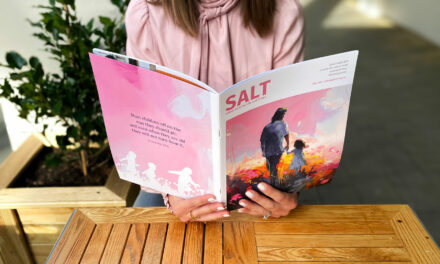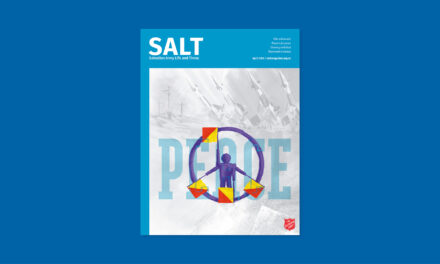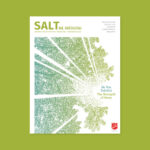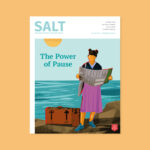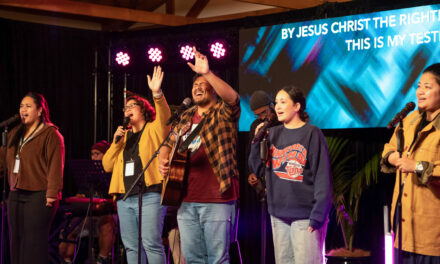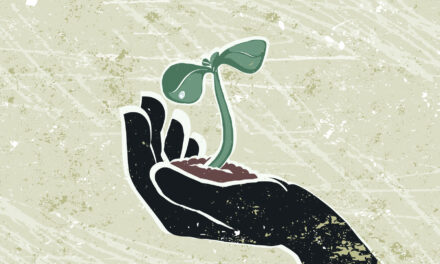
From Death Daily to New Life Every Day
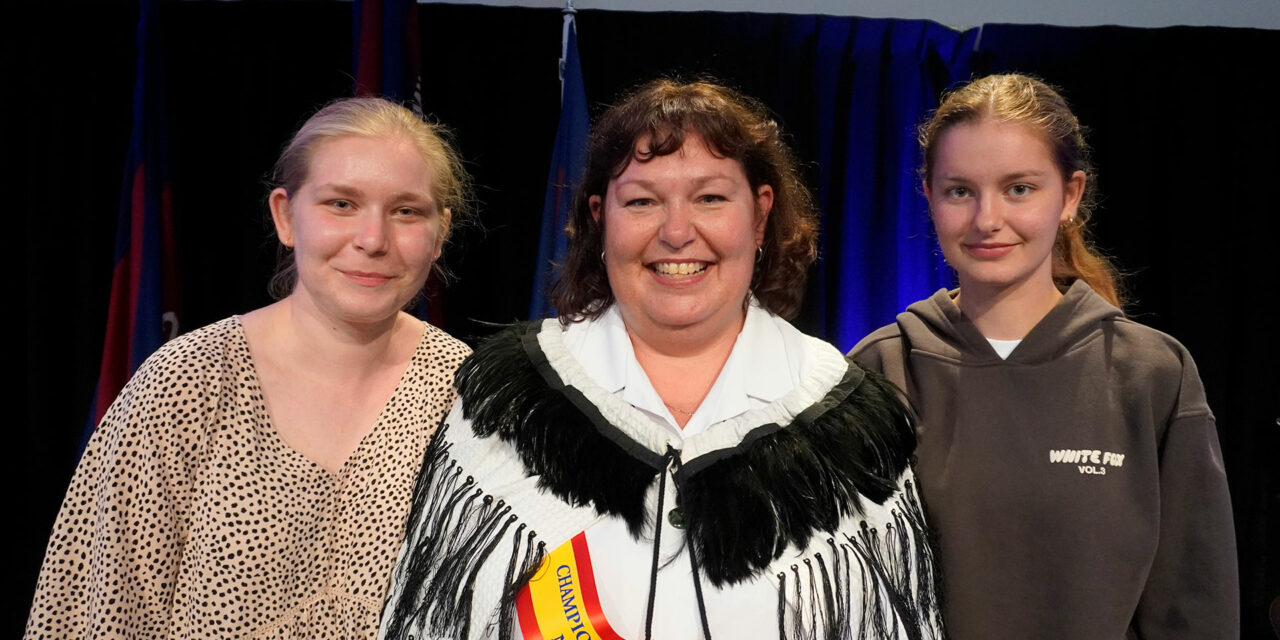
This article contains themes of death, abuse, suicide, PTSD and other trauma. While acknowledging latest research which does not endorse trigger warnings, we include this as a courtesy.
Tania Viljoen found her way to The Salvation Army and new life in Christ while living with post-traumatic stress disorder (PTSD). Today, not only is Tania full of hope for the future, but she is now a first-year cadet, passionate about sharing what God has done in and through her.
When forensic scientist Tania Viljoen found herself standing amidst the bloody aftermath of yet another violent crime scene, she realised she was done with police work. Heavily pregnant with her first child, Tania knew she no longer had the strength to compartmentalise the trauma she carried. ‘That was my moment,’ she says. ‘Walking into a place and seeing a dead child and not feeling anything—especially when you’re carrying one—that can’t be normal.’ That moment of clarity was the beginning of Tania’s long journey towards healing and a new life.
Raised in Pietermaritzburg, South Africa, Tania’s parents divorced each other twice during her childhood. ‘That in itself brought a lot of heartache,’ explains Tania, who also suffered abuse as a child at the hands of an extended family member. From a young age, Tania learnt to compartmentalise. So when she joined the police as a 20-year-old, Tania already had a well-established practice for coping with the horrors she experienced on the job.
Staring death in the face
The first time Tania came face-to-face with death was when she was working with the riot unit. ‘As part of my “initiation” the guys thought it would be a good idea to take me to a mortuary. They chose the biggest one in Durban, and it wasn’t orderly and sterile like in the movies, the bodies were literally stacked up on top of each other in piles on the floor in these huge walk-in fridges. Body upon body—body pieces even. And there were women who had died during childbirth, with their stillborn babies piled on top of them. It was horrible.’
There was no one Tania could speak with about this traumatic experience—which was the first of many. ‘There was no debriefing in the South African Police Force in the nineties,’ Tania explains. ‘There was no after-care or supervision—nothing. I didn’t realise how damaging it all was until toward the end of my career,’ Tania explains.
Interacting with death daily continued for Tania when she qualified as a ballistics specialist. Working at crime scenes, reconstructing scenarios to chart bullet trajectories, examining firearms and attending post-mortems were all part of the job. But Tania was suffering with undiagnosed PTSD.
‘I now understand there was a lot of compartmentalising going on—that’s how I coped. I was angry and numb all the time. I was angry at things I didn’t know still bothered me, like my parents divorcing. I was just angry at everything. I was hospitalised once during that time and they tried all sorts of antidepressants, but I wouldn’t take them consistently. I didn’t think a pill could fix what was broken inside me. Therapy was suggested but I wouldn’t engage, because in my eyes I wasn’t the problem—everyone and everything else was. So, I would default to anger because that was what I knew—anger and numbness were my normal.’
A second chance at life
Migrating to New Zealand in 2007 seemed like the opportunity for a second chance at life. Tania became pregnant again after settling in Auckland, but she was still living with undiagnosed PTSD, the effects of which played a part in the end of her marriage. ‘All that anger and hardness and numbness just came with me to New Zealand.’
Tania became concerned one of her girls wasn’t coping with the separation from her dad, so a therapy session was arranged. But it was quickly determined that the person needing help was Tania. ‘The therapist could clearly see that I wasn’t doing well, and that started a journey of about 40 sessions,’ explains Tania. ‘I wanted to get well, but it was all so confronting. And I was a solo mum which meant I came home from sessions to the girls. I had to be a mum, while trying to process my anger. It was very hard.’
Tania was formally diagnosed with PTSD, and as she did the hard work, her emotions began to surface. ‘It was like letting go of this control I had built up to protect myself. I was so used to compartmentalising—pushing things deep inside me. But therapy loosened everything up and now my emotions pour out! In a way, the diagnosis restored a sense of healthy control because now I can name why I acted and behaved and felt certain ways.’
Tania began to feel something stirring within her spiritually. ‘I tried a few churches, but as a solo mum, I felt looked down upon. Then I walked into East City Salvation Army, and everyone was so welcoming that I made friends quickly.’
Tania now had the mental space to take a spiritual deep dive. ‘Spiritually, there was a revival within me. I had been like a dead leaf, but I was coming back to life. I’d been so numb but now there was this new life in Christ.’
New life every day
God provided Tania with a job at Middlemore Hospital in the maternity ward. One morning she heard the screeching tyres of a car pulling up outside and a woman’s terrified screams. ‘My mind immediately went into police mode, and I assumed it was a stabbing and raced towards the action. But it wasn’t a stabbing, it was a woman in advanced labour! There was no time to go inside, so God took over and we birthed her baby in the car! It was amazing! I sensed God saying, “No more death, Tania, but new life every day!”’
Tania found a ministry amongst the women, especially those whose babies had been uplifted by Oranga Tamariki. ‘It was common, and it didn’t feel right to me as a mother myself. Irrespective of their pasts—they could be drug addicts or come from prison to give birth—on the maternity ward these women were mothers first and foremost. It felt wrong for them to leave with empty arms, so I always arranged for two matching teddy bears to be knitted—one to go with the baby and the other for the mum. The idea was that one day those two teddies would be reunited, and for the mothers to have something to hold in the meantime—especially those returning to prison alone.’
There were even times when Tania was able to pray with some of the mothers. ‘I wasn’t supposed to pray with them, but I did. I also took photos of them with their babies so that when they returned to prison with nothing to do but think, they would have something tangible to inspire them—someone to live for and keep going for.’
The language of prayer
A few years later a close friend from the police committed suicide. ‘I relapsed,’ says Tania. ‘This was someone I had worked with on a lot of crime scenes. His suicide was so hard to process, and the wheels came off for me.’
One night a friend became very concerned about Tania. ‘The police came to do a welfare check,’ she explains. ‘The officer had been in the South African police. “I know what you have seen, and I want to pray with you,” he said. He prayed in my own language of Afrikaans! Later I was at the hospital and the nurse who triaged me saw my cross necklace and she also prayed for me!’
God held Tania tightly throughout it all, as did her church family. ‘I just had to be with the people who loved me and understood my journey and wouldn’t judge me,’ testifies Tania. She now puts her sustained wellness down to that love, as well as therapy, medication, and the Spiritual 12 Steps she completed at Booth College of Mission (BCM) in 2019.
‘I use the analogy of a bookshelf. Before therapy and 12 Steps, the books were all crammed in haphazardly. If you pulled a book out, all the others fell out with it. But now my books are standing up straight and in some sort of order. I can take out a book without the rest of them toppling down on me.’
A growing sense of calling from God to share her story through ministry as a Salvation Army officer began to take root. Tania applied and was accepted for training and is currently a first-year cadet in the Champions of the Mission/Ngā Toa o te Mihana session. As Tania prepared to leave Auckland for training she spoke with her mum. ‘Mum told me to drive down safely, have fun, and that she was proud of me.’
Two days later, Tania’s mum passed away suddenly. ‘It was a huge shock, but I know now that I am well because I recognise that I need to grieve. I can take ‘Mum’ off my shelf and allow time to process her death. I have this awareness now that comes from a healthy place.’
Resurrection life
Tania has an Easter message for readers: ‘The resurrection is all about new life and second chances. And that’s the thing with me, I don’t want or need to sugarcoat any of this. I don’t want to hide it and say I wasn’t very well—I was suicidal. That’s the truth. There is no way around it. But God got me through, and I want others to know there is a way forward—there are so many others out there living with tough things. I’m not suggesting my story is unique because I know there are others who can relate, if not with all of it, then definitely with part of it. But when Jesus died on that cross and rose again, he gave everyone the opportunity not only for salvation—but also for a second chance—for a brand-new life!’

